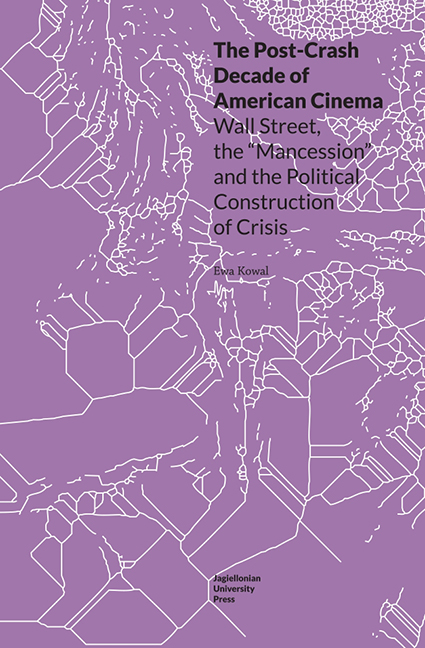 The Post-Crash Decade of American Cinema
The Post-Crash Decade of American Cinema Published online by Cambridge University Press: 05 May 2023
In their introductions, the editors of The Great Recession in Fiction, Film and Television: Twenty-First Century Bust Culture and the editors of Gendering the Recession: Media and Culture in an Age of Austerity dismiss the “mancession” as, respectively, “a myth” “bought into and promoted” by TV commercials and newspaper op-eds (Boyle and Mrozowski 2013: x) and a “buzzword” through which “accounts of economic decline frequently privilege male subjectivity” (Negra and Tasker 2014: 2). Since, like in Money Monster (and in the early American post-crash novel mentioned in the Introduction), most of the main characters in this second part of the book devoted to cinematic depictions of the victims of the 2007/8 financial crisis and its consequences in the US are (white) men, it appears that male subjectivity is also privileged in cultural “accounts of economic decline,” which solidify a common perception of the Great Recession as a “mancession.” For this reason, the term, its origin, and its implications call for a brief examination.
The term originated in academia, but was soon picked up by popular media outlets and became widely accepted, despite “[c]alls for a more detailed and nuanced look at the data” which inspired it (Peterson 2012: 280). An academic paper which explains well this emergence of the “mancession” discourse and its consequences is “The Great Crisis and the Significance of Gender in the US Economy” written for The Journal of Economic Issues by Janice Peterson, an Associate Professor in the Department of Economics, California State University-Fresno. Referring to the comparisons understandably made between the Great Recession and the Great Depression of the 1930s (from which the recession which “began in December 2007 and [officially] ended in June 2009” [ibid., 278] took its name), Peterson points to “[o]ne similarity observed between these two economic crises,” namely “that the greater concentration of men in cyclically sensitive industries contributed to higher rates of unemployment among men, contributing to an increase in women's share of the work force over the course of the downturn” (ibid.). As Peterson continues, this fact, as well as “predictions of women taking over the work force, gained wide attention through their association with a narrative that labeled the ‘Great Recession’ the ‘Great Mancession’ (or ‘Mancession’ or ‘He-cession’)” (ibid.).
To save this book to your Kindle, first ensure [email protected] is added to your Approved Personal Document E-mail List under your Personal Document Settings on the Manage Your Content and Devices page of your Amazon account. Then enter the ‘name’ part of your Kindle email address below. Find out more about saving to your Kindle.
Note you can select to save to either the @free.kindle.com or @kindle.com variations. ‘@free.kindle.com’ emails are free but can only be saved to your device when it is connected to wi-fi. ‘@kindle.com’ emails can be delivered even when you are not connected to wi-fi, but note that service fees apply.
Find out more about the Kindle Personal Document Service.
To save content items to your account, please confirm that you agree to abide by our usage policies. If this is the first time you use this feature, you will be asked to authorise Cambridge Core to connect with your account. Find out more about saving content to Dropbox.
To save content items to your account, please confirm that you agree to abide by our usage policies. If this is the first time you use this feature, you will be asked to authorise Cambridge Core to connect with your account. Find out more about saving content to Google Drive.